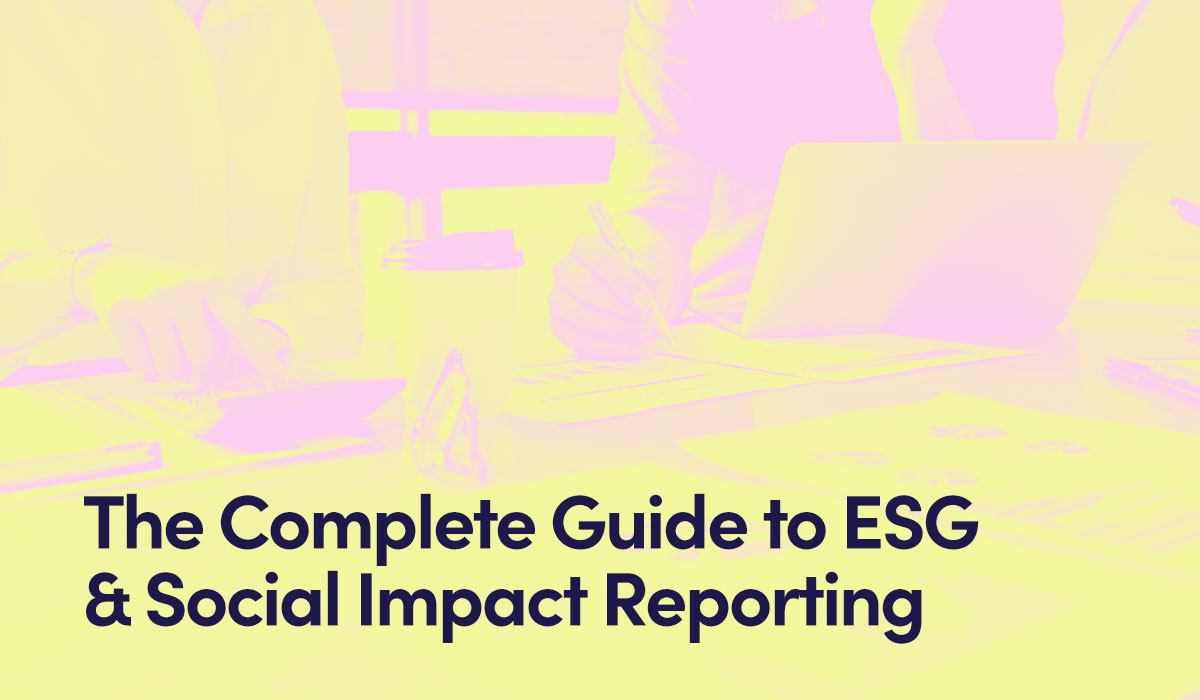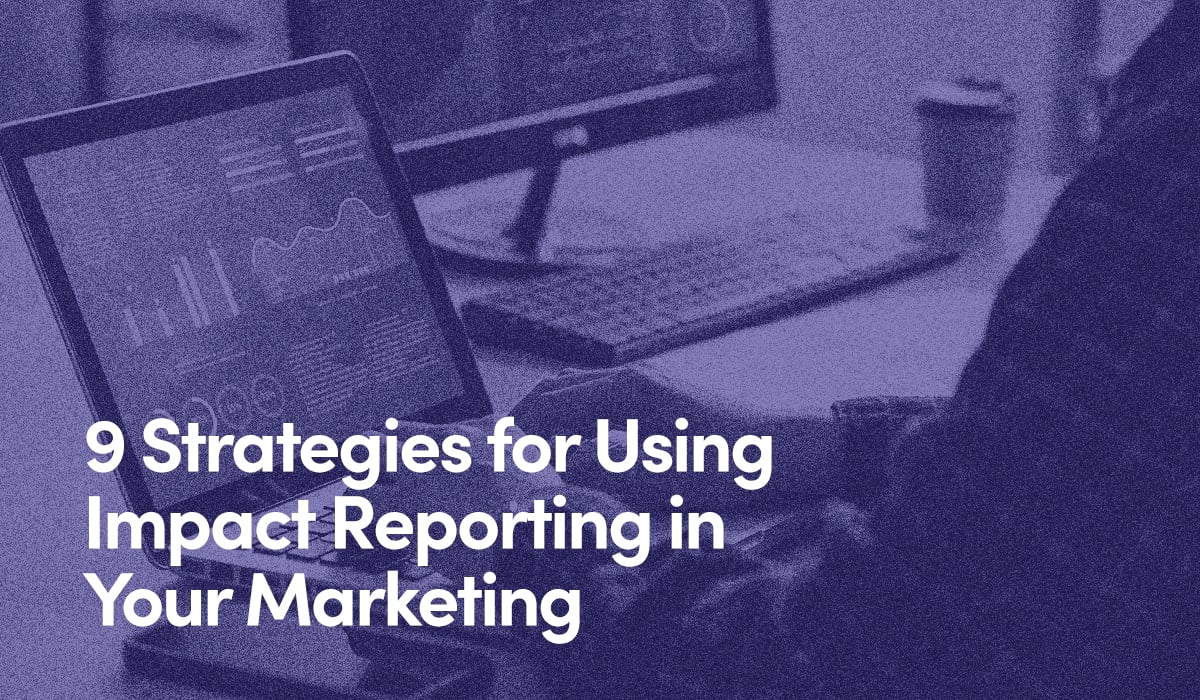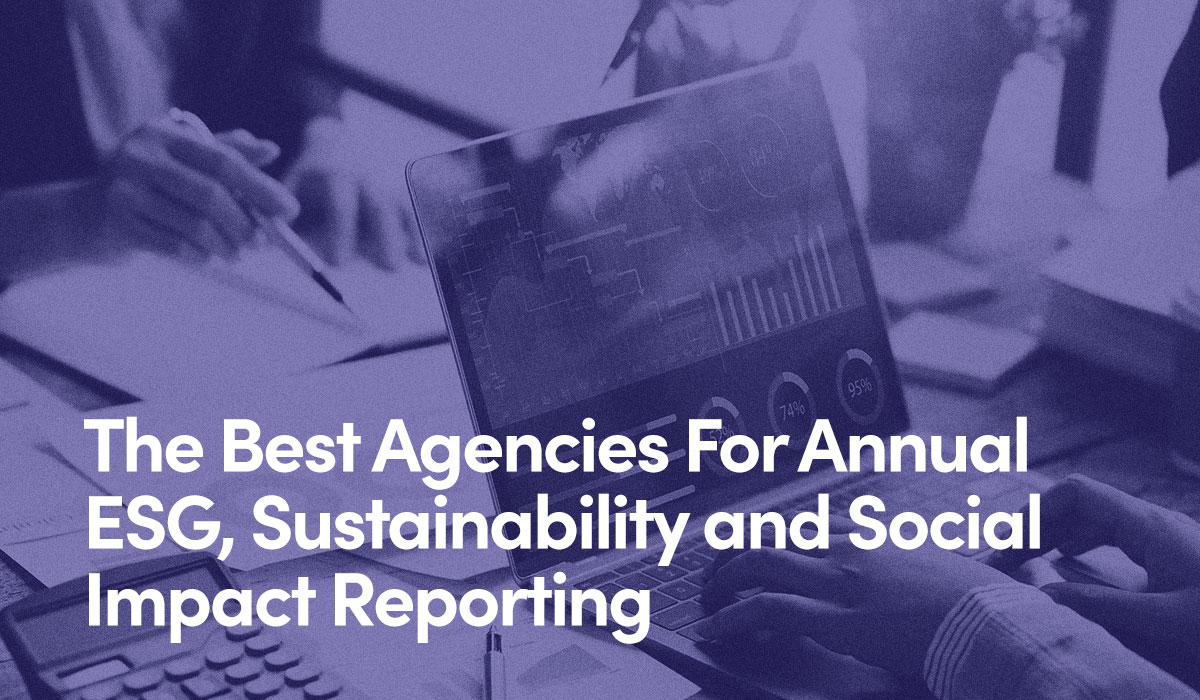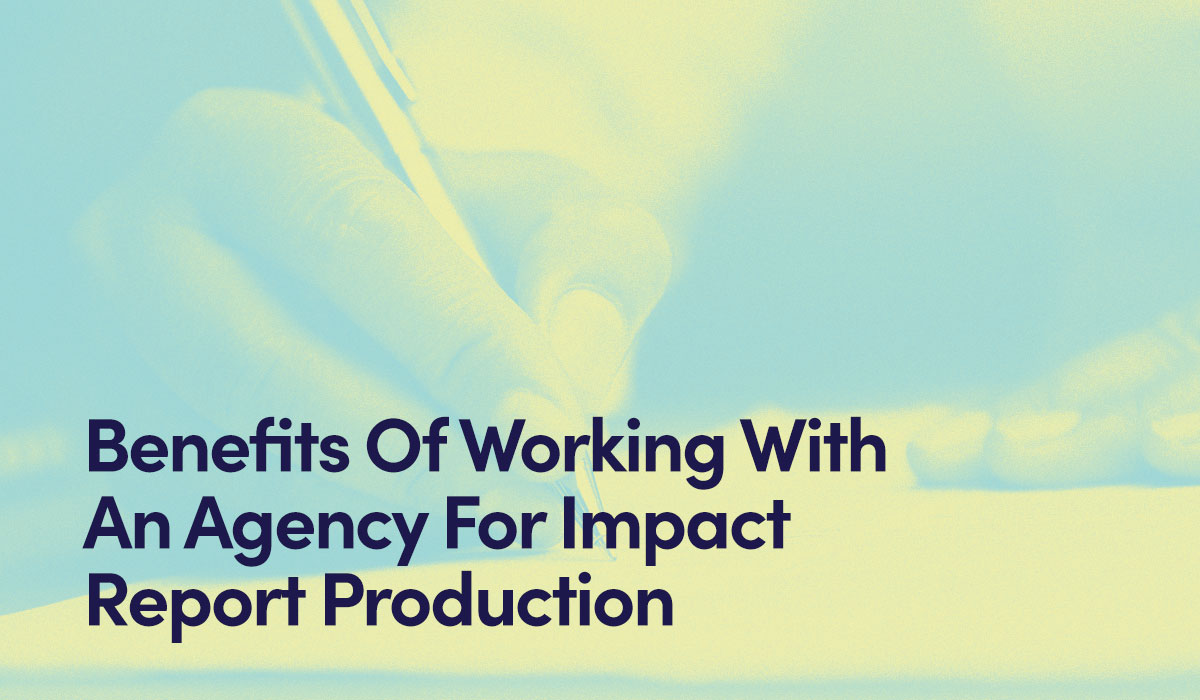With consumers and businesses alike expressing greater concern for various causes and societal crises, such as climate change, social impact and related reporting mechanisms have taken on greater importance. In today’s world, it is not enough for companies to focus solely on their financial performance. Stakeholders are demanding greater transparency and accountability when it comes to a company’s environmental, social, and governance (ESG) practices.
This has led to the rise of ESG, social impact, and other reporting, where companies disclose their efforts and impact in areas such as reducing carbon emissions, promoting diversity and inclusion, and ensuring ethical supply chains. By providing this information, companies can demonstrate their commitment to sustainability and social responsibility, which in turn can attract more conscious consumers and investors. As a result, ESG reporting has become an essential tool for businesses looking to build trust, mitigate risks, and contribute to a better future for both society and the planet.
A report by consulting firm McKinsey & Company suggests ESG and other forms of impact reporting are becoming the norm. According to its analysis:
- 90 percent of S&P 100 firms have embraced ESG reporting to some extent
- 70 percent of Russell 1000 companies are also reporting on their impacts
- Investments in sustainable funds have skyrocketed in recent years, surging from $5 billion in 2018 to more than $50 billion in 2020, and reaching nearly $70 billion in 2021.
- The trend toward ESG and social impact reporting can be attributed not only to regulatory mandates, but also to the voluntary efforts of companies that are committed to transparency and sustainability.
While high levels of investment in sustainable funds are a relatively new phenomenon, corporate social responsibility goes back decades.
In this guide, we’ll explore the benefits of social impact and ESG reporting and how it can be used as a tool to supplement and bolster your broader digital marketing efforts.
Exploring the Origins of Social Impact Reporting
The roots of early social impact reporting date back to the mid-20th century, when the concept of a social contract between the business community and general public began to emerge. Howard R. Bowden’s influential book “Social Responsibilities of the Businessman,” published in 1953, played a fundamental role in this evolving philosophy, which gave rise to the Corporate Social Responsibility (CSR) movement, the precursor to today’s more all-encompassing impact disclosures.
In 1971, the Committee for Economic Development (CED), consisting of business leaders and economists, published a paper titled “Social Responsibilities of Business Corporations,” which also served as a catalyst.
The paper argued that “[t]he discontinuity between what we have accomplished as producers and consumers and what we want in the way of a good society has engendered strong social pressures to close the gap—to improve the way the overall American system is working so that better quality of life can be achieved for the entire citizenry within a well-functioning community.”
The recommendations put forth by CED were ambitious:
- The elimination of poverty
- Equal opportunities regardless of race, sex, or creed
- “Livable communities” supported by “decent housing, safe streets, a clean and pleasant environment, efficient transportation,” and more
The Rising Power of ESG: Driving Change in Today’s Economy
In today’s economy, ESG has become the umbrella term for the various types of social impact reporting. While popular among corporations across industries, it has also faced some backlash and skepticism from critics who oppose environmental and sustainability policies, as well as from those who doubt the credibility of claims made by major corporations, including those in the fossil fuel industry, which is most responsible for the climate crisis.
ESG first became popularized in 2004 following the publication of a joint report by a collection of financial institutions at the behest of the United Nations (UN) titled “Who Cares Wins.”
“The institutions endorsing this report are convinced that in a more globalized, interconnected and competitive world the way that environmental, social and corporate governance issues are managed is part of companies’ overall management quality needed to compete successfully,” the report said.
It also argued that the firms that embraced ESG could see an increase in shareholder value: “Moreover, these issues can have a strong impact on reputation and brands, an increasingly important part of company value.”
Resource:
Annual Non-Financial Reporting: Demystifying ESG, Social Impact, DEI & CSR
Different Approaches to Reporting Social Impact
When it comes to reporting mechanisms, ESG is undoubtedly gaining prominence in the business world. However, it is important to acknowledge that ESG is just one type of reporting that organizations are utilizing to showcase their commitment to various causes. Other popular reporting mechanisms include social impact, sustainability, CSR, and DEI.
Corporate Social Responsibility (CSR)
CSR reporting encompasses a diverse array of corporate initiatives, reflecting a corporation’s commitment to mitigating its adverse effects on society. Such reports serve as a signal to both the public and stakeholders that a company is actively striving to make a positive impact on society.
As the Harvard Business Review notes, CSR reports have historically covered four categories:
- Environment - reducing waste, such as single-use plastics, shifting to renewable energy, planting trees, etc.
- Economic - reaching financial goals without contributing negatively to society
- Ethical - recognizing that everyone within a corporation’s orbit should be treated fairly, including employees, customers, and investors, among others
- Philanthropic - financially supporting organizations working toward the betterment of society
In recent years, there has been a notable shift among companies from traditional CSR reporting to embracing ESG-like standards and metrics. While both CSR and ESG shed light on a company’s social impact initiatives, ESG takes a more formal approach by incorporating financial and quantifiable metrics that provide concrete evidence of the impact being made. This move towards ESG reporting helps companies substantiate their claims and demonstrate their commitment to creating a positive and measurable change.
Social Impact Reporting
Non-financial social impact reporting covers a wide spectrum of corporate activity, from environmental and economic impacts to Diversity, Equity, and Inclusion (DEI) and brand initiatives. This type of reporting helps organizations communicate their mission to important stakeholders, such as employees, customers, and investors. Like other reporting methods, it should offer transparency regarding internal targets, even if the data doesn’t align with previously set goals.
In recent years, organizations have increasingly embraced non-financial social impact reporting as a powerful tool to communicate their efforts and goals in a compelling narrative format. While some reports may lack quantifiable data, many companies choose to highlight key data points to showcase their initiatives and even acknowledge any negative consequences. To better summarize their impacts, businesses are turning to popular frameworks such as the Theory of Change, United Nations’ Sustainable Development Goals, and the Five Dimensions of Impact. These frameworks provide a structured approach to effectively communicate their actions.
Diversity, Equity & Inclusion (DEI) Reporting
Diversity, Equity, and Inclusion (DEI) encompasses a comprehensive understanding of the demographic composition of employees, including gender, race, and ethnicity, across various positions. Equity goes beyond the mainstream understanding of “representation” and focuses on providing fair access and opportunities for everyone. Inclusion, on the other hand, evaluates the extent to which employees feel a genuine sense of belonging in their work environment.
The growing interest in DEI reporting stems from an increasing body of research that highlights the correlation between workplace diversity and financial prosperity.
A survey performed by the Boston Consulting Group in 2017 revealed that companies with above-average diversity scores experienced a 19 percent increase in revenue, underscoring the impact diversity can have on a company’s bottom line.
“The biggest takeaway we found is a strong and statistically significant correlation between the diversity of management teams and overall innovation,” BCG said in its analysis of the survey.
Environmental, Social & Governance (ESG) Reporting
Environmental, Social, and Governance (ESG) reporting is a contemporary approach to measuring a company’s social impact, distinct from traditional CSR and other non-financial reporting methods. Its primary purpose is to better capture company “value” by including information related to ESG risk exposure and mitigation efforts.
This form of financial disclosure has gained significant traction in recent years as companies recognize the need to transparently communicate a more expansive assessment of business risk as well as their sustainability efforts and demonstrate commitment to responsible business practices, both for ethical and business purposes. This reporting framework goes beyond the traditional CSR approach by incorporating measurable metrics that provide concrete evidence of a company’s impact on, and risk from the environment and society.
- When it comes to environmental impact, ESG reporting focuses on factors such as carbon emissions, energy consumption, waste management, and resource usage. By quantifying and disclosing this information, companies can evaluate their environmental performance and identify areas for improvement. This data also allows investors, customers, and other stakeholders to make informed decisions based on a company’s environmental practices.
- ESG reporting also covers social factors, such as employee welfare, community engagement, and human rights. This includes initiatives related to diversity and inclusion, employee well-being, philanthropy, and community development.
- Governance refers to how a company is managed and governed. This includes such factors as board composition, executive compensation, risk management, and ethical business practices. By disclosing information about their governance structure and policies, companies can demonstrate transparency and accountability to their stakeholders. When it comes to risks, companies often disclose potential exposures impacting their operations, reputation, and financial health. Risks could be related to climate change, regulatory changes, supply chain issues, labor practices, and so on.
By embracing ESG reporting, companies can enhance their reputation, attract socially conscious investors, and contribute to a more sustainable and equitable future.
Resources:
Annual Non-Financial Reporting: Demystifying ESG, Social Impact, DEI & CSR
What’s the Difference Between ESG, CSR & DEI Reporting?
Showcase Your Positive Impact on the World
Want to Connect With Values-Driven Consumers and Investors?
Amplify Your Story With Social Impact Reporting arrow_forwardThe Importance of Social Impact & ESG Reporting
Social impact and ESG disclosures are rapidly becoming a necessary part of doing business, regardless of industry or the size of a particular firm. It is becoming increasingly common for both major corporations and small to medium-sized businesses to produce disclosures highlighting their impacts, underscoring why it’s becoming vital for organizations to decide what a social impact or ESG assessment would look like. Central to this is the concept of “sustainability,” which the United Nations (UN) defines as “meeting the needs of the present without compromising the ability of future generations to meet their own needs.”
Countries Now Mandating ESG Disclosures
Eighteen years after the UN spearheaded the effort to have financial institutions produce a report about ESG, more and more governments are mandating such disclosures. One analysis found that at least 25 countries are requiring ESG information to be disclosed. In 2022, the United States Securities and Exchange Commission (SEC) proposed new rules related to ESG: One meant to enhance disclosures by certain investment advisers and another centered around climate-related risks, which would impact all registrants. Despite the lack of formal regulation in the United States and other parts of the world, however, an estimated 90 percent of S&P 100 firms are performing some type of ESG disclosure. For perspective, some of the wealthiest corporations in the world are listed on the index.
For all intents and purposes, organizations are recognizing that it’s important to highlight their impacts, both positive and negative. Investors are increasingly making decisions based on various environmental, social, and governance factors, while consumers are becoming more conscience which companies they want to support.
Consumers Rally Behind Brands that Embrace Their Core Values
If organizations need more evidence that social impact and ESG-related disclosures are important, they should look no further than their own customers. Consumer habits have shifted over the years, with people more likely to spend their hard-earned cash on products or services developed by companies that they align with personally.
Research commissioned by Google Cloud found that 82 percent of people surveyed agreed that it’s important for a brand to share their values. On a related note, a staggering 75 percent of respondents said they’ve abandoned companies that lack a shared perspective.
As Google Cloud noted in an accompanying blog post, “a majority of shoppers will not compromise on principles.”
“If there’s a value mismatch, 39% of shoppers said they’d permanently boycott their favorite brand, and 24% would break ties at least temporarily,” the post read.
Benefits of Social Impact & ESG Reporting
With company stakeholders and consumers embracing sustainability transparency, organizations are fully aware of the potential financial benefits of social impact and ESG-style reporting. By publicly disclosing their environmental, social, and governance practices, companies can attract socially conscious investors who prioritize sustainable and responsible business practices. These investors understand that companies committed to creating a positive social and environmental impact are more likely to achieve long-term success and stability. This level of transparency not only attracts loyal customers but also helps to build trust and loyalty among existing customers.
In addition to attracting investors and consumers, social impact and ESG reporting can also lead to cost savings and operational efficiencies. Here are a few examples:
- By measuring and disclosing their environmental impact, companies can identify areas where they can reduce waste, energy consumption, and carbon emissions.
- By prioritizing diversity, equity, and inclusion in their reporting, companies can create a more inclusive and innovative workforce, leading to improved productivity and employee satisfaction.
- By embracing sustainability transparency, organizations can not only contribute to a more sustainable and equitable future but also enhance their reputation, attract investors, and gain the loyalty of socially conscious consumers.
It is clear that social impact and ESG reporting have become essential tools for companies looking to thrive in today’s socially and environmentally conscious business landscape. As with anything, a reporting initiative will only be deemed a “success” if you fully embrace transparency, are honest about your assessments, and display a genuine commitment to making progress toward your key goals. Even a social impact report that’s considered “negative” can be turned into a positive, so long as an organization is dedicated to making necessary changes.
Harnessing the Power of Social Impact Reporting to Enhance Brand Exposure
As more and more businesses embrace the practice of social impact reporting, there are additional strategies you can employ to enhance your brand visibility and reach a wider audience. These include highlighting positive performance, generating related content and marketing material, engaging with stakeholders at a deeper level, aligning with industry standards, and attracting new talent.
From a digital marketing perspective, marrying social impact storytelling with inbound marketing principles can help you engage with your most loyal customers while simultaneously developing connections with a robust, digital audience. This can include blog posts, case studies, videos, emails, and infographics that delve deeper into the specific initiatives and projects your company is involved in. By creating compelling and informative content, you can educate and inspire your audience while reinforcing your brand’s commitment to social impact.
It is essential to consider future employees when deploying a social impact report and any associated digital marketing strategy. Attracting new talent is a crucial aspect of enhancing brand visibility and reaching a wider audience. Millennials and Gen Z, in particular, are increasingly seeking out companies that align with their values and offer opportunities for meaningful work. By highlighting your social impact initiatives and commitments, you can attract top talent who are passionate about making a difference and contributing to your company’s success.
Resources:
Why Is Environmental, Social & Governance (ESG) Reporting So Important?
Is Your Social Impact Report Negative? Here’s How to Respond
9 Things to Consider When Creating an Annual ESG, Sustainability, or Social Impact Report
Elements of Annual ESG, Sustainability & Social Impact Reports
How to Leverage Your ESG & Social Impact Reporting for Brand Visibility
Advantages of Collaborating with a Social Impact Reporting Partner
As the demand for social impact reporting continues to grow, organizations are recognizing the need for specialized expertise to effectively navigate this evolving landscape. Many companies are turning to third-party agencies that specialize in social impact reporting to provide valuable support and guidance. These agencies have extensive knowledge and experience in collecting important data, establishing realistic goals, and providing advice on areas for improvement.
Working with a social impact agency can offer numerous benefits. One of the key advantages is their ability to help organizations collect and analyze the necessary data to create comprehensive and accurate reports. These agencies have access to a wide range of tools and methodologies that enable them to gather and interpret relevant information, ensuring that the report reflects the true impact of the organization’s initiatives.
These agencies can assist in establishing realistic goals and targets for social impact. By leveraging their expertise, organizations can set meaningful and achievable objectives that align with their overall mission and values.
Importantly, a social impact agency can help organizations construct a compelling and accurate narrative about an organization’s impact. That’s because they boast the expertise to craft engaging stories that effectively communicate the organization’s social and environmental initiatives to stakeholders. This is accomplished by highlighting positive outcomes, discussing progress to date (even setbacks), and showcasing the organization’s commitment to making a difference, enhancing its reputation and brand image.
Selecting the Ideal Partner for Social Impact Reporting
Choosing the right social impact reporting partner for your company requires patience and some due diligence on your part. As with anyone you hire to provide a service, it’s vital to ensure they’re reputable, understand your business and broader goals, and are interested in being a true partner.
With that in mind, there are several key questions you’re going to want answered before you arrive at a decision.
- What services do you provide?
- Can you provide examples of impact reports you’ve created?
- How do you measure success?
- What is your report creation process?
- How much work will creating a report be for my team?
- What deliverables do you provide?
- What social impact frameworks do you use?
- How do you keep pace with best practices?
- What project management software do you use & file types can you work with?
- How does your pricing work?
While choosing the appropriate partner can be painstaking, this phase of your journey is especially critical. Once a reporting partner is hired, they’re going to want to get to work on mapping out and producing an impact report. Realizing months later that the agency is not the ideal fit, can either lead to significant delays or stall your process entirely.
Resources:
Should You Work With a Partner on Your Social Impact Report?
Benefits Of Working With An Agency For Impact Report Production
10 Questions to Ask a Prospective Social Impact Reporting Partner
The Best Agencies For Annual ESG, Sustainability & Social Impact Reporting
What’s Ahead for Social Impact & ESG Reporting?
As the field of social impact and ESG reporting continues to evolve, organizations are exploring different frameworks to effectively measure and assess their impact. At the same time, businesses are keeping a close eye on emerging regulations, which can have a major impact on global corporations.
In March 2022, the Securities and Exchange Commission (SEC) announced new requirements for climate-related disclosures. Similar regulations in Europe have been issued via the Corporate Sustainability Reporting Directive.
As we noted earlier, at least 25 countries have established their own rules related to ESG reporting. The combination of uncertainty in the regulatory space and the availability of competing frameworks no doubt complicates the disclosure process. In an earlier blog about the future of social impact and ESG reporting, we noted a universal framework isn’t coming anytime soon.
Here are some additional trends to keep an eye on in the realm of social impact and ESG reporting:
- Increased scrutiny around supply chains, underscored by recently established EU rules related to human rights and climate impacts
- B2B companies are more closely monitoring their value chain partners, just as consumers are serving as a check on B2C firms
- A rise in anti-ESG rhetoric, which has bled into actual policy-making decisions
- Related to the politics around ESG is “greenwashing,” an accusation leveled against fossil fuel companies, justifiably in many cases, for misleading the public and investors about their climate claims
- More companies are communicating their impacts, even if they’re deemed to be negative
Resources:
What’s Ahead for ESG & Impact Reporting?How to Choose Relevant ESG, Sustainability & Social Impact Metrics
Beginning your Social Impact Journey
If you’re feeling unsure about embarking on your social impact journey because of these emerging trends, particularly in terms of regulations, consider this: the pressure from industry and consumers may push you to take action sooner than expected. However, taking a proactive approach and starting your journey sooner rather than later can give your organization a competitive edge. By being an early adopter of social impact reporting, you can position your company as a leader in sustainability and responsible business practices. This can not only attract positive attention from customers and investors but also differentiate your brand from competitors.
The benefits of starting early extend beyond just staying ahead of the curve. By beginning your social impact journey now, you have the opportunity to shape the narrative surrounding your company’s impact.
Starting early gives you the time and flexibility to refine your reporting processes and strategies. As you gather data and track your progress, you can identify areas for improvement and make adjustments accordingly. This iterative approach allows you to continuously improve your social impact efforts and demonstrate tangible results over time. It also positions you as a company that is committed to learning and adapting, which can enhance your reputation and credibility in the eyes of stakeholders.
Finally, a well-crafted social impact report, combined with an intelligent and persuasive digital marketing strategy, can serve as a powerful tool for engaging with customers, investors, and employees, showcasing your commitment to social responsibility and sustainability. By effectively communicating your impact and sharing compelling stories, you can inspire others to join your cause and create a ripple effect of positive change.
Bringing Social Impact to Market: The Next Phase in Growth-Driven Content Marketing
At Hypha HubSpot Development, we translate your impact into a compelling narrative that clarifies your message, amplifies your mission, and enables like-minded customers, investors, and talent to engage with your brand. Learn more about our non-financial social impact reporting capabilities.




